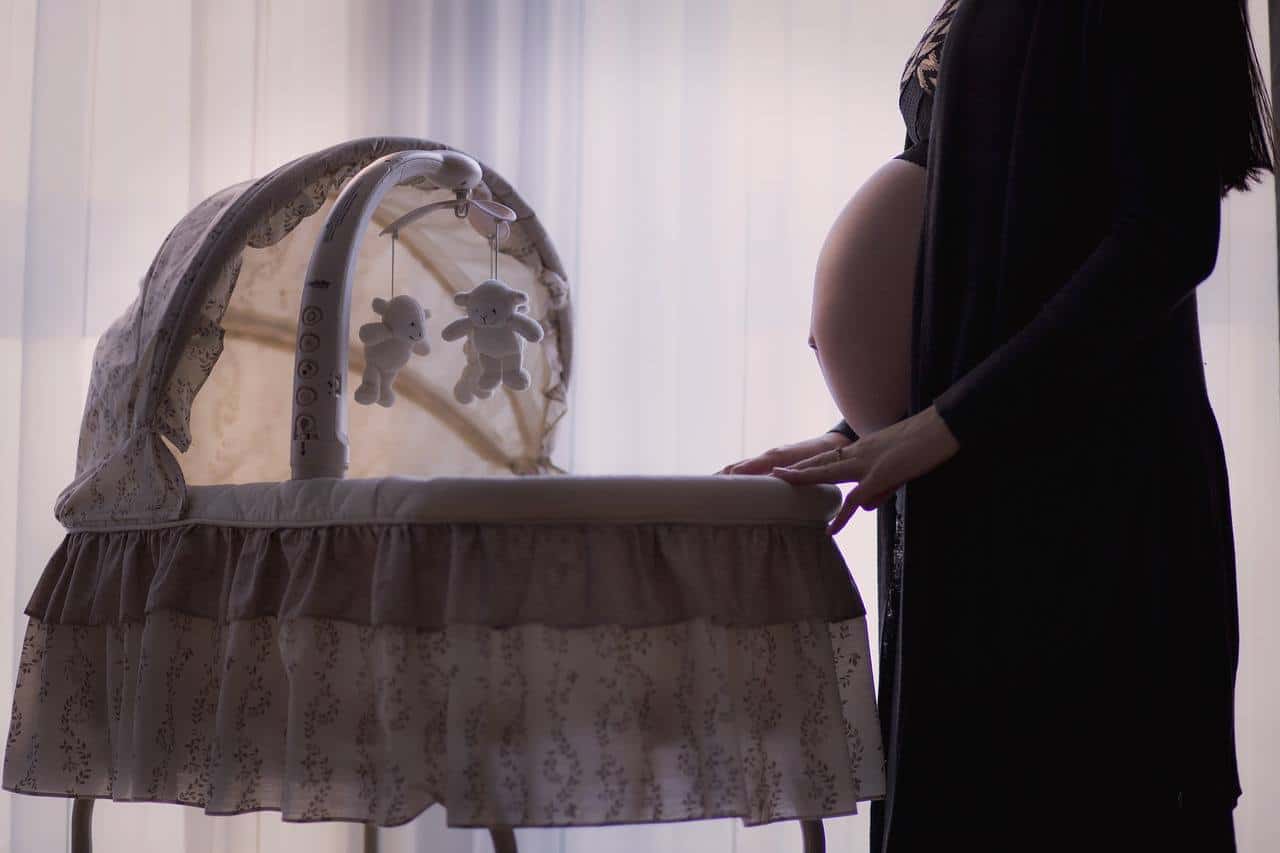Low level of social support is commonly cited as a risk factor for postpartum depression.
For example, an early review by Michael O’hara and Annette Swain in 1996 (1), reported that, among other factors, poor marital relations and low social support were strong predictors of postpartum depression.
However there is still considerable uncertainty about what “social support” actually means when trying to identify moms who may be at risk for postpartum depression.
In particular it is important to know which forms of social support may be especially protective against postpartum depression so that they can be encouraged.
Similarly, by knowing how the particular circumstances of a mom’s social relationships can influence her risk of postpartum depression, it means that at-risk moms can be highlighted early on in a proactive, rather than reactive manner.
Although social support doesn’t act alone as being a risk factor for postpartum depression, the frequency with which it is cited in the scientific literature as a risk factor merits a review of what the science says about it.
One of the greatest controversies relates to whether it is the relationship or marital status of the mom – in other words whether she is living alone as a single mom or in a cohabiting stable relationship with the father – which is important. Or whether it is more the quality of her social relationships which is more important. Separating out these two concepts, which can be highly correlated – is not always straightforward and has led to inconsistencies in the findings.
However, there is now starting to be sufficient data on the topic for some trends to emerge within the scientific literature.
In this article we aim to answer the following questions:
- Does marital status affect the likelihood of postpartum depression?
- What matters more, the status or the quality of the relationships?
- Does social support from the extended family and friends protect against postpartum depression?
- How does social support work to protect against postpartum depression?
- Can you use someone’s level of social support as a predictive measure of how at risk the mom is of suffering from postpartum depression
Why is it important to understand the relationship between level of social support and postpartum depression?
Postpartum depression is one of the most common psychiatric challenges that a mom may face in relation to the birth of her child.
Evidence shows that postpartum depression has a negative impact on the mom’s ability to adequately cope with the stresses of motherhood. It can also impair the emotional bond between mom and baby, which can have long lasting effects for the emotional well-being of the child.
Early identification of moms who may be at risk from postpartum depression, even before she starts to show depressive symptoms, could help to ensure that if/when symptoms do develop that the therapeutic systems can readily be put in place to enable her to receive the help and support that she requires as early as possible.
Knowing how the social relationships in a mom’s life can impact her risk of postpartum depression can be used to guide the kind of questions that health professionals ask during the mom’s pregnancy or postpartum to screen for those who are at higher risk.
Key Point: If we know what causes postpartum depression we can act to prevent it. We can also use this information to screen women for postpartum depression during and after pregnancy in order to provide timely treatment.
What exactly do we mean by “social support”?
The imprecise nature of the term “social support” can make it challenging to make comparisons across studies and often explains inconsistencies between studies.
For example what one researcher means by social support might be different from another, but both might still choose to use the term social support.
In addition, social support is a multidimensional concept and only by deconstructing it into its component parts can you start to understand what aspects of social support are important for postpartum depression, rather than seeing it from an umbrella perspective.
For example social support can mean an immediate partner, close family, extended family, or friends. In addition, it can reflect the quality or status of the relationships, the social structure or physical living arrangements.
As it is likely that some types of social support are more important for postpartum depression compared to others, and that this may vary according to circumstance and culture, knowing more about these finer details can help to better inform health policy and guide interventions from health professionals.
Key Point: it’s important to define what social support means, and what kind of social support is important to prevent postpartum depression.
How did we conduct our research?
We searched for terms relating to social support and social relationships combined with postpartum depression using Pubmed, the database of scientific and medical publications.
We identified 12 studies which specifically explored the relationship between social support and postpartum depression, in addition to 3 systematic reviews, one which included 215 studies.
Their findings will be discussed below.
Does Marital Status Affect the Likelihood of Postpartum Depression?

A study in 2006 from the University of York (2) with 18,533 families looked at the parental relationship and postpartum depression and specifically focused on whether the mom was married, cohabiting or single.
Their results suggests that cohabiting and single moms had a greater risk of postpartum depression compared to married moms when controlling for a range of sociodemographic factors.
However large scale studies which show significant correlations like this, and do not include other pieces of social support data to help interpret those correlations, can be misleading. They require further research to help explain this relationship and determine the other contributing factors which are also playing a role (e.g. they do not consider relationship quality in this study, only status).
Key points to this study: This study concluded that married moms had a lower risk of postpartum depression than single or cohabiting moms. However, this result is potentially misleading as the study did not take into account other factors such as relationship quality which are known to be important.
A study in 2011 from the University of New South Wales (3) examined a number of demographic risk factors of postpartum depression in 25,455 moms from the Sydney district.
They found that the marital status of the mom – i.e. whether they were married, single or had a partner was not associated with postpartum depression. They also explored a number of social community factors and revealed that moms who had only lived in a neighbourhood for a short period of time, or who originally were not from the Sydney district (i.e. born in another country) were more at risk of developing postpartum depression. This reveals how the perception of social support extends wider than the family unit.
Key points to this study: This study conducted in Sydney showed that the marital status of the mom was not associated with postpartum depression. It also showed that moms new to a neighborhood were more at risk of developing postpartum depression, revealing how social support extends wider than the family unit.
CONCLUSION
Examining the mom’s relationship status alone, even with large numbers of moms, offers inconsistent results and is not sufficient to understand the relationship between postpartum depression and social support.
Does The Quality of the Primary Relationship of the Mother Affect the Likelihood of Postpartum Depression?

A study in 2010 by Ayse Akincigil and colleagues from Rutgers University (4) reviewed both marital status and also relationship quality with the father of the baby as independent factors in a sample of 4348 moms.
They found that when you controlled for the quality of the relationship with the father – in other words there was a good relationship between the mother and father even if they were no longer living together, then single women were no more likely to be depressed compared to married or cohabiting women.
Or to put it the other way around, if the mom is living with her partner, but the relationship was poor, stressful or abusive then this could also be a risk factor for postpartum depression. Including the factor of quality, not just status, is important in reveal, in more precise detail, the true risk factors postpartum depression.
Key Points to this study: When you take into account relationship status AND quality, then it is the quality that comes out as a more important risk factor for postpartum depression, not solely relationship status.
Another study in 2014 from the University of California San Diego (5) with 1,568 moms explored risk factors associated with postpartum depression and found that moms who experienced less stress in their couple relationship were less likely to report depressive symptoms, even when they had a personal history of depression.
In other words a supportive couple relationship is a protective factor for those who might have a predisposition for postpartum depression.
But to put it the other way a stressful relationship can be associated with higher levels of depressive symptoms and so a it is not being a relationship per se that is important, but the levels of stress in that relationship.
Key points to this study: Moms in a supportive couple relationship have a reduced risk of developing postpartum depression. Moms in a stressful relationship have a greater risk of developing postpartum depression. Therefore it’s not being in a relationship per se that is important, but the level of stress in that relationship.
In 2015 a review by Ilona Yim, and colleagues from the University of California (6) analyzed 215 studies including 151,651 moms to explore a range of biological and social risk factors for postpartum depression. Within the subgroup of studies which specifically focused on social support, they found that 14 studies showed no association between marital or partner status and depressive symptoms or diagnosis whilst 13 studies showed that women who were married or cohabiting with the baby’s father had fewer depressive symptoms or a lower risk of postpartum depression compared to women separated from their partner or not in a relationship during the first postpartum year. However the authors remarked that there were an additional 6 studies on subgroups of moms who had not met the criteria for their review which provided additional evidence for the idea that the stable cohabitation (in other words a mix of quality and status) with the partner may be a protective factor for postpartum depression.
They also explored the role of general social support more generally and revealed 23 studies which strongly supported the link between poor social support with a further 11 providing a weaker association. In contrast only 8 studies showed no association between the likelihood of postpartum depression and the level of perceived social support. Additional evidence from studies which have looked at other aspects of social support such as the level of received support or sources of social support also provided evidence to support the hypothesis that the level of social support is an important factor in postpartum depression and that if social support is absent then it can be a potential risk factor for postpartum depression.
Their analysis of the literature specifically on the mom’s relationship quality with a partner, rather than her relationship’s status, showed that there was a consistent body of research (20+ studies) that linked stronger partner relationships with postpartum depression across the first year after birth. However, they also reported 7 studies that did not support the importance of relationship quality on postpartum depression, reminding us of the complexity of measuring this complex phenomenon.
Key points to this review: There is strong evidence supporting the idea that low social support is a risk factor for postpartum depression. This review also reflects the diversity of the literature on the role of relationship status and quality on postpartum depression. The data suggests that relationship status alone is not a key risk factor for postpartum depression but interacts with other contributing factors, including the quality of the partner relationship.
Taking into consideration the relationship quality and stability starts to reveal that this is an important risk factor for postpartum depression.
CONCLUSION
Relationship quality and stability are important risk factors for postpartum depression.
Does the Quality of the Mom’s Relationship With Her Close Family Affect the Likelihood of Postpartum Depression?

A study in 2015 by the the University of Hong Kong (7) with 200 moms explored the role of social support in postpartum depression. The results showed that having a poor sense of family coherence increased depressive symptoms for mothers (and fathers) at 6 months postpartum. In this study, family coherence was defined as having a family environment that is comprehensible (structured and predictable), meaningful (challenging and worthwhile), and manageable (adequate resources to cope with challenges).
This emphasizes the importance of the quality and stability of the relationship and how this goes beyond just the immediate partner but also includes the whole family unit.
Key points to this study: This study suggests that the protective nature of social support against postpartum depression can extend beyond the immediate mother-father relationship and that having a stable and supportive family network is also important.
A joint study in 2015 by Ankara University and King’s College London (8) explored a number of family influences on postpartum depression with 578 moms.
They found that in Turkish moms, the incidence and persistence of depression were associated with lower emotional support from the mother-in-law and the husband. In this study, social support was measured using the Close Persons Questionnaire which focuses on three aspects of the quality of individual relationships—(1) emotional support; (2) practical support; (3) negative aspects of the relationship. No difference in postpartum depression was found according to family structure – ie. whether there were grandparents also living in the house with the parents, rather than only the parents of the child.
Key points to this study: In Turkish moms, lower emotional support from the mother-in-law and husband was associated with higher incidence and persistence of postpartum depression. This specific contribution of the mother-in-law highlights the cultural variation in the sources of social support across different groups of moms.
Another study from Nagoya University in Japan in 2015 (9) explored the relationship between social support during pregnancy and postpartum depression with 877 Japanese moms. They measured social support using the Japanese version of the Social Support Questionnaire and found that having a higher number of supportive people available during pregnancy helped protect against postpartum depression, as measured at 1 month postpartum. This was suggested to be more important than the general level of satisfaction with the social support on offer during pregnancy. This finding is different from some other studies, but could reflect cultural differences.
Key points to this study: In Japan, the number of supportive people available during pregnancy offered more protection against postpartum depression then the general level of satisfaction from that support. Since this finding is different from other studies, it may reflect cultural differences.
A systematic review in 2013 by the London School of Economics and Political Science (10), with stringent inclusion and exclusion criteria, examined 9 studies from South Asia, on the relationship between social support and postpartum depression. The review showed that social relationships were important determinants of postpartum depression and that it wasn’t just the relationships with direct family members that was important, but also the relationships with extended family members (e.g. in-laws). The authors also suggest that the quality of the relationship is more important than the actual structure of the family and that conflict in those relationships is a risk factor for postpartum depression. The importance of the in-laws in these countries also emphasises the fact that the concept of what is considered “social support” may vary according to the cultural and social background of the mother.
[Key points to this review: This review emphasizes the importance of the wider family unit for providing social support for moms who come from a South Asian cultural upbringing. It highlights that different cultural subgroups will interpret beneficial social support differently. There is therefore no one-size fits all solution for what is the “best” kind of social support but instead the measures and interventions have to reflect cultural variations. The study also supports the findings that it is the relationship quality that is particularly important, rather that the social structure within the family.
In conclusion.
The level of social support on offer from the wider family, beyond the mom’s primary relationship also influence the mom’s risk of postpartum depression. In addition, socio-cultural factors can influence what kind of social support is most protective against postpartum depression.
CONCLUSION
The level of social support from the wider family also influences the mom’s risk of postpartum depression.
In addition, socio-cultural factors can influence what kind of social support is most protective against postpartum depression.
What is the process through which social support influences postpartum depression?

A study in 2012 by a research group at the University College, Cork (11) with 410 first time moms measured a number of social factors and their association with postpartum depression measured at 6 weeks postpartum. They particularly looked at the role of social support on the mother’s feelings of self-efficacy – the mom’s beliefs about her ability to be successful in the parenting role – which is known to be important in postpartum depression.
They found that close family support, as well as having a good informal social network of friends and family, was important for increasing a mom’s self-efficacy, which in turn was associated with lower levels of postpartum depression. They also found that lower levels of social support from family and friends was associated with higher levels of postpartum depression.
This suggests that one way that social support may be protective against postpartum depression is through increasing the mom’s belief about her own ability as a mother. Whether this is specifically relevant for first time moms, or whether it extends to moms who already have children is still not clear.
Key points to this study: According to this study one key route through which good social support from family and friends can be a protective factor against postpartum depression is through its ability to increase the mom’s belief about her ability to become a successful parent – what’s called “self-efficacy” in technical speak.
In a study in 2015 of 4150 moms, researchers from Florida State University (12) showed that social support is a significant protective factor for postpartum depression. They also looked at the interaction between social support and feelings of stress to explore whether one of the ways that social support might mediate this protective effect is via reducing feelings of stress in the mom. However, they did not find evidence to support this.
They also showed that the type of social support – for example from an intimate partner, family or friends – that is beneficial to the mom varies according to whether the mom is married, cohabiting, or single, emphasizing the fact that the relative benefits of different types of social support are situation-dependant.
Key points to this study: This study suggests that the protective effects of social support against postpartum depression are not mediated through a general reduction in the mom’s feeling of stress. It also highlights that the type of social support which is of most benefit to the mom varies according to her living situation and relationship status.
In Conclusion:
The protective nature of social support against postpartum depression may, in part, be explained by the way it provides a boost to the mom’s self-belief about her ability as a parent, rather than by generally reducing her level of stress.
CONCLUSION
The protective nature of social support against postpartum depression may, in part, be explained by the way it provides a boost to the mom’s self-belief about her ability as a parent.
Can we use a mom’s level of social support to predict her risk of postpartum depression?

A study in 2011 by University College, Cork, (13) was conducted with 512 first-time mothers to examine the relationships between social support and postpartum depression at 6 and 12 weeks postpartum.
As well as demonstrating the importance of social support in reducing the risk of postpartum depression more generally, they also showed that the levels of formal structural support (i.e. help with household tasks and hands-on infant care) and emotional support that the mom received at birth was a predictor of postpartum depression at 12 weeks. This suggests that evaluating the social support available at birth could be a way to identify those at risk of depressive symptoms later on.
Key points to this study: This study suggests that measuring the amount of structural (help with household tasks and infant care) and emotional support available to the mom when the baby is born can be used to predict her risk of postpartum depression.
Another study this time by McGill University in 2014 (14) with 226 moms explored a number of antenatal factors which influenced the likelihood of a mom showing depressive symptoms. They found that one predictive factor was the level of social support during pregnancy. Lower levels of social support were associated with a higher likelihood of postpartum depression. In this study they used a questionnaire called the MOS Social Support Survey which measures perceived support from one’s social network.
The evidence suggests that assessing the level of social support (as well as other metrics such as depressive symptoms during pregnancy) could be one way to help highlight those at risk from depressive symptoms postnatally.
Key points to this study: This study shows that having a lower level of social support during pregnancy is associated with a higher likelihood of postpartum depression. Therefore pregnancy offers an opportunity to start to assess the social support available to the mom and identify those individuals who are at risk from postpartum depression.
Another recent study in 2017 by researchers at Shandong University in China (15) used the Perceived Social Support scale to explore the relationship between social support and postpartum depression with 240 moms.
They showed that a higher level of perceived social support during pregnancy was associated with a lower likelihood of developing pregnancy depression. They also showed that a higher level of perceived social support postnatally was associated with a lower likelihood of developing postpartum depression. However, social support scores in late pregnancy did not predict the risk of postpartum depression.
This is slightly inconsistent with the study reported above, suggesting that other factors may also play a role in the relationship between pregnancy social support and postpartum depression.
Key points to this study: This study showed that increased social support during pregnancy was protective against antenatal depression, but was not predictive of the mom’s risk of postpartum depression. This is in contrast with the study above, possibly reflecting differences in the methods used, or the fact that other factors can also contribute to the onset of postpartum depression.
In Conclusion:
Quantifying the type and level of social support available to mom during at birth may help to identify those potentially at risk from postpartum depression. Measuring social support during pregnancy may also provide a useful indication of postpartum depression but additional studies are required to confirm this.
CONCLUSION
Quantifying the type and level of social support available to mom during at birth may help to identify those potentially at risk from postpartum depression.
Measuring social support during pregnancy may also provide a useful indication of postpartum depression.
What is the conclusion?
In conclusion, there is significant evidence supporting the idea that low levels of social support is a risk factor for postpartum depression. The studies also highlight which forms social support are particular risk-protective, and which forms are particularly risk-promoting.
Returning to the questions from the start which we aimed to answer in this article, we can make the following conclusions.
Does marital status affect the likelihood of postpartum depression?
The evidence is highly inconsistent but does not support the idea that marital status alone affects the likelihood of postpartum depression. However evidence suggests that the type of social support that is protective for a mom may differ according to her relationship status.
What matters more, the status or the quality of the relationships?
The evidence more widely supports the idea that it is the quality and stability of the relationship that is especially important, rather than the status. Although status, stability and quality are interrelated phenomenon, a mom in a married, but stressful and unstable relationship is potentially at risk from postpartum depression, whilst a single mom who still maintains a good relationship with the father may not be any more at risk from postpartum depression than a married or cohabiting mom who has a good relationship with her partner
Does social support from the extended family and friends protect against postpartum depression?
Yes, although the particular way that this is protective against postpartum depression can vary across socio-cultural groups with different members of the family being potentially important depending on the cultural background of the mom. The overall coherence of the family unit is also important as a protective factor.
How does social support work to protect against postpartum depression?
Although there are likely to be several mechanisms through which social support acts to protect against postpartum depression, the way it can improve a mom’s self-belief about her own abilities as a mother seems to be one route. In contrast social support seems to be less effective at generally reducing a mom’s feelings of stress.
Can you use a mom’s level of social support as a predictive measure of how at risk she is of suffering from postpartum depression?
Yes, evidence suggests that by quantifying the mom’s level of emotional and practical support early on, possibly during pregnancy or at birth, you can obtain a measure of how at risk she might be of postpartum depression.
What are the practical implications?
From the studies and meta-analyses above we can conclude that social support affects a woman’s risk of experiencing postpartum depression as follows:
- Being surrounded with stable and positive relationships helps to protect against postpartum depression.
- This support can come from a partner, extended family or the wider community depending on the particular circumstances and the mom’s cultural environment.
- Poor social support and/or a stressful relationship with a partner are risk factors for postpartum depression.
Therefore:
- Pregnant women and their families should be educated to understand that social and relationship support at birth (both emotional and practical) is important to the mental health of the mother. It should be seen as a necessity and not a luxury.
- Assessing social and relationship support at birth (both emotional and practical) could provide an indication of whether the mom is going to be at risk from postpartum depression.
FINAL CONCLUSIONS
Pregnant women and their families should be educated to understand that social and relationship support at birth (both emotional and practical) is important to the mental health of the mother. It should be seen as a necessity and not a luxury.
Assessing social and relationship support at birth (both emotional and practical) could provide an indication of whether the mom is going to be at risk from postpartum depression.
References:
1. Akincigil, A., Munch, S., & Niemczyk, K. (2010). Predictors of Maternal Depression in the First Year Postpartum: Marital Status and Mediating Role of Relationship Quality. Social Work In Health Care, 49(3), 227-244. https://dx.doi.org/10.1080/00981380903213055
2. Banker, J., & LaCoursiere, D. (2014). Postpartum Depression: Risks, Protective Factors, and the Couple’s Relationship. Issues In Mental Health Nursing, 35(7), 503-508. https://dx.doi.org/10.3109/01612840.2014.888603
3. Cankorur, V., Abas, M., Berksun, O., & Stewart, R. (2015). Social support and the incidence and persistence of depression between antenatal and postnatal examinations in Turkey: a cohort study. BMJ Open, 5(4), e006456-e006456. https://dx.doi.org/10.1136/bmjopen-2014-006456
4. Eastwood, J., Phung, H., & Barnett, B. (2011). Postnatal Depression and Socio-Demographic Risk: Factors Associated with Edinburgh Depression Scale Scores in a Metropolitan Area of New South Wales, Australia. Australian & New Zealand Journal Of Psychiatry, 45(12), 1040-1046. https://dx.doi.org/10.3109/00048674.2011.619160
5. Jones, E., & Coast, E. (2013). Social relationships and postpartum depression in South Asia: A systematic review. International Journal Of Social Psychiatry, 59(7), 690-700. https://dx.doi.org/10.1177/0020764012453675
6. Kiernan, K., & Pickett, K. (2006). Marital status disparities in maternal smoking during pregnancy, breastfeeding and maternal depression. Social Science & Medicine, 63(2), 335-346. https://dx.doi.org/10.1016/j.socscimed.2006.01.006
7. Leahy-Warren, P., McCarthy, G., & Corcoran, P. (2011). Postnatal Depression in First-Time Mothers: Prevalence and Relationships Between Functional and Structural Social Support at 6 and 12 Weeks Postpartum. Archives Of Psychiatric Nursing, 25(3), 174-184. https://dx.doi.org/10.1016/j.apnu.2010.08.005
8. Leahy-Warren, P., McCarthy, G., & Corcoran, P. (2012). First-time mothers: social support, maternal parental self-efficacy and postnatal depression. Journal Of Clinical Nursing, 21(3-4), 388-397. https://dx.doi.org/10.1111/j.1365-2702.2011.03701.x
9. Li, Y., Long, Z., Cao, D., & Cao, F. (2017). Social support and depression across the perinatal period: A longitudinal study. Journal Of Clinical Nursing, 26(17-18), 2776-2783. https://dx.doi.org/10.1111/jocn.13817
10. Morikawa, M., Okada, T., Ando, M., Aleksic, B., Kunimoto, S., & Nakamura, Y. et al. (2015). Relationship between social support during pregnancy and postpartum depressive state: a prospective cohort study. Scientific Reports, 5(1). https://dx.doi.org/10.1038/srep10520
11. Ngai, F., & Ngu, S. (2015). Predictors of maternal and paternal depressive symptoms at postpartum. Journal Of Psychosomatic Research, 78(2), 156-161. https://dx.doi.org/10.1016/j.jpsychores.2014.12.003
12. O’hara, M., & Swain, A. (1996). Rates and risk of postpartum depression—a meta-analysis. International Review Of Psychiatry, 8(1), 37-54. https://dx.doi.org/10.3109/09540269609037816
13. Reid, K., & Taylor, M. (2015). Social support, stress, and maternal postpartum depression: A comparison of supportive relationships. Social Science Research, 54, 246-262. https://dx.doi.org/10.1016/j.ssresearch.2015.08.009
14. Verreault, N., Da Costa, D., Marchand, A., Ireland, K., Dritsa, M., & Khalifé, S. (2014). Rates and risk factors associated with depressive symptoms during pregnancy and with postpartum onset. Journal Of Psychosomatic Obstetrics & Gynecology, 35(3), 84-91. https://dx.doi.org/10.3109/0167482x.2014.947953
15. Yim, I., Tanner Stapleton, L., Guardino, C., Hahn-Holbrook, J., & Dunkel Schetter, C. (2015). Biological and Psychosocial Predictors of Postpartum Depression: Systematic Review and Call for Integration. Annual Review Of Clinical Psychology, 11(1), 99-137. https://dx.doi.org/10.1146/annurev-clinpsy-101414-020426








